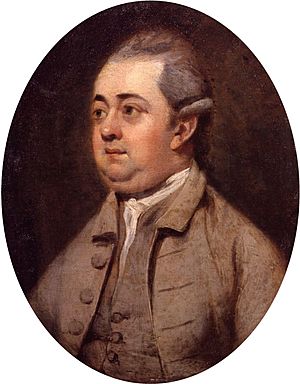The Decline and Fall of the Roman Empire facts for kids
| Author | Edward Gibbon |
|---|---|
| Country | England |
| Language | English |
| Subject | history of the Roman Empire |
| Publisher | Strahan & Cadell, London |
|
Publication date
|
1776–89 |
| Media type | |
| LC Class | DG311 |
The Decline and Fall of the Roman Empire is a very famous book. It was written by Edward Gibbon, an English historian from the 1700s. This important book tells the story of the Roman Empire. It covers the time from the late 90s AD until the end of the Eastern Roman Empire, also known as the Byzantine Empire.
The book was published in six parts. The first part came out in 1776. The last three parts were released in 1788 and 1789. It covers the history of the Roman Empire, Europe, and the Catholic Church. The story goes from the year 98 AD all the way to 1590 AD. It talks about how the Roman Empire became weaker in the East. It also explains how it finally collapsed in the West.
Gibbon's book was very fair and used many original documents. Because of this, his way of writing history became a guide for historians who came after him. This is why Edward Gibbon is often called the first "modern historian of ancient Rome".
Why the Roman Empire Fell
Edward Gibbon offered his ideas about why the Roman Empire collapsed.
He believed the Roman Empire fell to barbarian invaders. This happened because its citizens slowly lost their "civic virtue." This means they stopped caring as much about their country. They became weaker and started using barbarian soldiers, called mercenaries, to protect the Empire. Eventually, these mercenaries became so many that they were able to take control.
Gibbon thought that Romans no longer wanted to live a tough, military lifestyle. He also argued that Christianity made people believe in a better life after death. This made Roman citizens less interested in their current lives. It also made them less willing to make sacrifices for the Empire. He also felt that Christianity's focus on pacifism (being against war) hurt the traditional Roman fighting spirit.
Like other thinkers from the Age of Enlightenment, Gibbon looked down on the Middle Ages. He saw it as a "dark age" full of superstition and controlled by priests. People during his time believed that human progress could only continue with reason and logical thinking.
Gibbon also saw the Praetorian Guard as a main reason for the Empire's early problems. He thought they caused its slow decay and final collapse. He believed this problem started with Augustus at the very beginning of the Empire. Gibbon gave many examples of the Praetorian Guard misusing their power. This led to terrible results, including killing emperors and always demanding more pay.
Gibbon's Views on Christianity
In his first book, especially in Chapters 15 and 16, Gibbon questioned the history of the Church. He believed there were far fewer Christian martyrs (people who died for their faith) than people thought. Before Gibbon, the Church's early history was rarely questioned.
However, Gibbon saw Church writings as secondary sources. This means they were not original accounts. He chose to use primary sources instead. These were original documents from the time he was writing about. This is one reason why Gibbon is called the "first modern historian."
Gibbon's main idea was that Christianity was a key reason for the Empire's decline and fall. He wrote:
- "The introduction, or at least the abuse, of Christianity, had some influence on the decline and fall of the Roman empire. The clergy successfully preached the doctrines of patience and pusillanimity; the active virtues of society were discouraged; and the last remains of military spirit were buried in the cloister".
He also wrote more generally:
- "The various modes of worship which prevailed in the Roman world were all considered by the people as equally true; by the philosophers as equally false; and by the magistrate as equally useful". (volume 1, chapter 1)
Most historians today do not agree with Gibbon's main idea. Today, historians usually look at money and military reasons for Rome's decline.
Editions
Gibbon kept making changes to his book even after it was published. Understanding all these changes can be tricky. Womersley's complete edition of the book explains these details in its introduction and extra sections.
- In-print complete editions
- In-print abridgements
See also
 In Spanish: Historia de la decadencia y caída del Imperio romano para niños
In Spanish: Historia de la decadencia y caída del Imperio romano para niños
 | William L. Dawson |
 | W. E. B. Du Bois |
 | Harry Belafonte |


